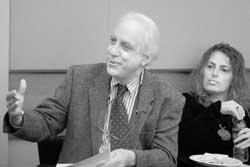Startling One Another, with Passion: Hervé Varenne on George Bond
For my first 15 years at Teachers College, George and I rarely crossed paths as we moved through the ranks, through tenure and promotion. We were anchored in different “Divisions” of the College that reflected the kind of profound political, economic, and symbolic chasms that concerned George as person and scholar, whether in Zambia, Atlanta, or Columbia University. But across the many divisions that separated us, I felt his presence. The adjective “formidable” is the one that keeps coming to me as most evocative for my experience of George. He would not be taken lightly, and he would not take you lightly, whether you were a colleague, an administrator, or a student. This, often, was disconcerting and might throw you off any easy balance. But it was also bracing and a call for more precision, and indeed more force, in the presentation of one’s stance, which, when the call was heeded, took one to a stronger position. Many students gained much from this, as I have.
When I joined the programs in anthropology, in the late 1980s, George was unfailingly warm in his welcome. He was also unfailingly demanding in his challenges to simple-minded statements relying on assumptions that were not spelled out. He asked for more from every one, whether in seminars or program meetings. One could stress his patience. I knew that I had to do better when he suddenly addressed me as “... Man!” My surprise, if not shock, had only partially to do with my sense that I was approaching a world of British education that I had never experienced, since my roots are in provincial France rather than in the complex international and cosmopolitan worlds George inhabited at various moments in his life. It must have had something to do with the fact that he was a student of Lucy Mair and others at the London School of Economics, while I was taught by David Schneider and others at the University of Chicago. Our mentors knew each other, respected each other, and radically criticized the kind of anthropology each were encouraging. The differences that sometimes led us to startle each other must also have had to do with the fact that I knew little about Africa and remained ready to write about “America” – something I never convinced George I could do! It may also have had to do with reverse “elective affinities.” George often startled students with questions about this altogether difficult concept from Max Weber which clearly spoke to him. I am not much of a Weberian and always wished that he would explain the concept. But he preferred letting us find out for ourselves. I also resisted George’s call for a theoretical and methodological eclecticism that I am not sure he “really meant” or that he may have meant, more powerfully, as a challenge to the easy dogmatism that masks ideological choices probably grounded in under-analyzed interests.
These were but some of the matters with which we startled each other even as they revealed a deeper and fundamental agreement, indeed passion. With George, I am convinced of the peculiar value of disciplined (which is more than disciplinary) anthropology. It is a value to our polities at large as, together, we push them to reform themselves to be more like what they should be. It is also a value to the polities within which we more directly participate, particularly in the many worlds that Teachers College touches, in schools whatever form they take, in hospitals and all medical settings, that is, in all the institutions where human beings take care of each other, in the United States and all around the world.
George knew that all of us will pass. He also knew and kept teaching us that it is our duty to provide the foundations for what is to be built in our futures. George tirelessly worked to insure this future. He did so, literally, with his last breaths. His formidable call for all of us to give everything to the collective task at hand will be sorely missed.
Published Friday, May. 16, 2014
